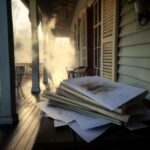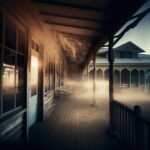Search Results for 'run'
-
AuthorSearch Results
-
February 18, 2023 at 3:56 pm #6553
In reply to: The Jorid’s Travels – 14 years on
Luckily for them, the sand structure with the nearby nests of snapping sand turtles was also a graveyard for the military drones that weren’t apparently programmed to register natural elements as threats.
They quickly found four of them who weren’t completely damaged, and with some technical assist from Jorid, Georges was able to repair the propulsion and deactivate the military programs and tracking beacons.
Klatu had some ropes in his speedster that they tied to their rudimentary drive and the drones, so they could carry Léonard’s body while he was still in stasis.
His vitals were generally positive, and Salomé kept checking on him, while Georges and Klatu managed attaching the odd assemblage of drones to their craft.
The ride back wasn’t as bad as the first time, maybe due to the extra cargo that made maneuvres more complex for their green driver.
“This is worth the detour. Seems like Klatu really wanted to save time and avoided to show us the scenic route the first time,” said Georges trying to break the tense worried silence.
Salomé smiled weakly “Léonard’s consciousness is embroiled into complex thoughts; they have to deal about some threat, the nature of which eludes me for now. It looks as though he’s absorbed some sort of forbidden knowledge, something potentially dangerous,” Salomé said to Georges. “I’m no longer as sure he was imprisoned for his punishment, but rather for protection…” she sighed. “for everyone else’s protection… I will feel better when we’re all back to the Jorid and we can run a full diagnosis.”
Georges looked at his friend apparently sleeping, and wrapped a loving arm around Salomé’s shoulder “It’s not going to be long now. He’s going to be fine.”

“Horrible doing business with you.” Klatu said as they parted, rubbing his hands together in gleeful satisfaction. Whatever the Jorid had organised as a deal for his payment, it seemed the added drones weren’t part of it and came as an extra bonus.

Inside the Jorid, while Salomé was setting up space for Léonard and making the preparation for the diagnosis, Georges looked at the tiles board, readying the craft for imminent departure.
A new tile had appeared, with a distinct pattern form, almost like an ogee.
“Jorid, is this new?”
“Indeed Georges, our adventure has inspired me to create new avenues of exploration.”
“Oh, that’s fresh.” Georges looked into the shifting symbol at its surface. After it stabilised, he could see there was a sort of spiral shell with forms reminiscent of the mocking turtles peeking out from the centre, surrounded by sand dunes.

“Jorid, tell me more please.”
“Sure, I’d call it ‘Sandshell‘. Do you want the full curriculum?”
“Absolutely, colour me intrigued!”
“The Sandshell:
Function: A reminder of the fragility of our perceived reality and the importance of questioning our assumptions
Families: Vold, Zuli, Ilda
Significance: The Sandshell represents the shifting and unstable nature of our beliefs, assumptions, and understandings. Like the sand that slips through our fingers, so too can our perception of the world around us be ephemeral and illusory. The image of the mock turtle serves as a reminder that we often live under assumed identities and in a world built on questionable foundations.
As advice: The Sandshell encourages one to question their beliefs and assumptions, to examine the foundations upon which they have built their reality, and to search for a deeper understanding of truth.
Depiction: The Sandshell can be depicted as a spiral shell with a mocking turtle peeking out from the center, surrounded by sand dunes. The sand symbolizes the instability of our perceptions and the turtle represents the assumed identities and neurotic fairy tales that make up our reality. The spiral form of the shell represents the journey of discovery and self-reflection.”“I love it,” said Georges enthusiastically “can we use it to plot our next course?”
“As a matter of fact we can Georges. Let me realign the grid and propose some suggestions. Do you have a seed thought to offer for this journey?”
Georges pondered for a while, when the image of the fishboard sprung forth in his mind. “Our little adventure is reminding me of our origins, Jorid —Léonard, working on the fishboard, your ancestor in a way… Us, finding Léonard… It feels like an adventure back to our origins. Can you project a destination on this vector…” then thinking at Salomé’s worried face “… that would be safe for our next stop, and allow us to find help for Léonard.”
“Verily.” Jorid answered back. “Course plotted. Please get comfortable until we arrive at our destination.”
February 18, 2023 at 2:38 pm #6552In reply to: Orbs of Madjourneys
When Xavier woke up, the sun was already shining, its rays darting in pulsating waves throughout the land, blinding him. The room was already heating up, making the air difficult to breathe.
He’d heard the maid rummaging in the neighbouring rooms for some time now, which had roused him from sleep. He couldn’t recall seeing any “DO NOT DISTURB” sign on the doorknob, so staying in bed was only delaying the inevitable barging in of the lady who was now vacuuming vigorously in the corridor.
Feeling a bit dull from the restless sleep, he quickly rose from the bed and put on his clothes.
Once out of his room, he smiled at the cleaning lady (who seemed to be the same as the cooking lady), who harumphed back as a sort of greeting. Arriving in the kitchen, he wondered whether it was probably too late for breakfast —until he noticed the figure of the owner, who was quietly watching him through half-closed eyes in her rocking chair.
“Idle should have left some bread, butter and jam to eat if you’re hungry. It’s too late for bacon and sausages. You can help yourself with tea or coffee, there’s a fresh pot on the kitchen counter.”
“Thanks M’am.” He answered, startled by the unexpected appearance.
“No need. Finly didn’t wake you up, did she? She doesn’t like when people mess up her schedule.”
“Not at all, it was fine.” he lied politely, helping himself to some tea. He wasn’t sure buttered bread was enough reward to suffer a long, awkward conversation, given that the lady (Mater, she insisted he’s called him) wasn’t giving him any sign of wanting to leave.
“It shouldn’t be long until your friends come back from the airport. Your other friend, the big lad, he went for a walk around. Idle seems to have sold him a visit to our Gems & Rocks boutique down Main avenue.” She tittered. “Sounds grand when we say it —that’s just the only main road, but it helps with tourists bookings. And Betsy will probably tire him down quickly. She tends to get too excited when she gets clients down there; most of her business she does online now.”
Xavier was done with his tea, and looking for an exit strategy, but she finally seemed to pick up on the signals.
“… As I probably do; look at me wearing you down. Anyway, we have some preparing to do for the Carts & whatnot festival.”
When she was gone, Xavier’s attention was attracted by a small persistent ticking noise followed by some cracking.
It was on the front porch.
A young girl in her thirteens, hoodie on despite the heat, and prune coloured pants, was sitting on the bench reading.
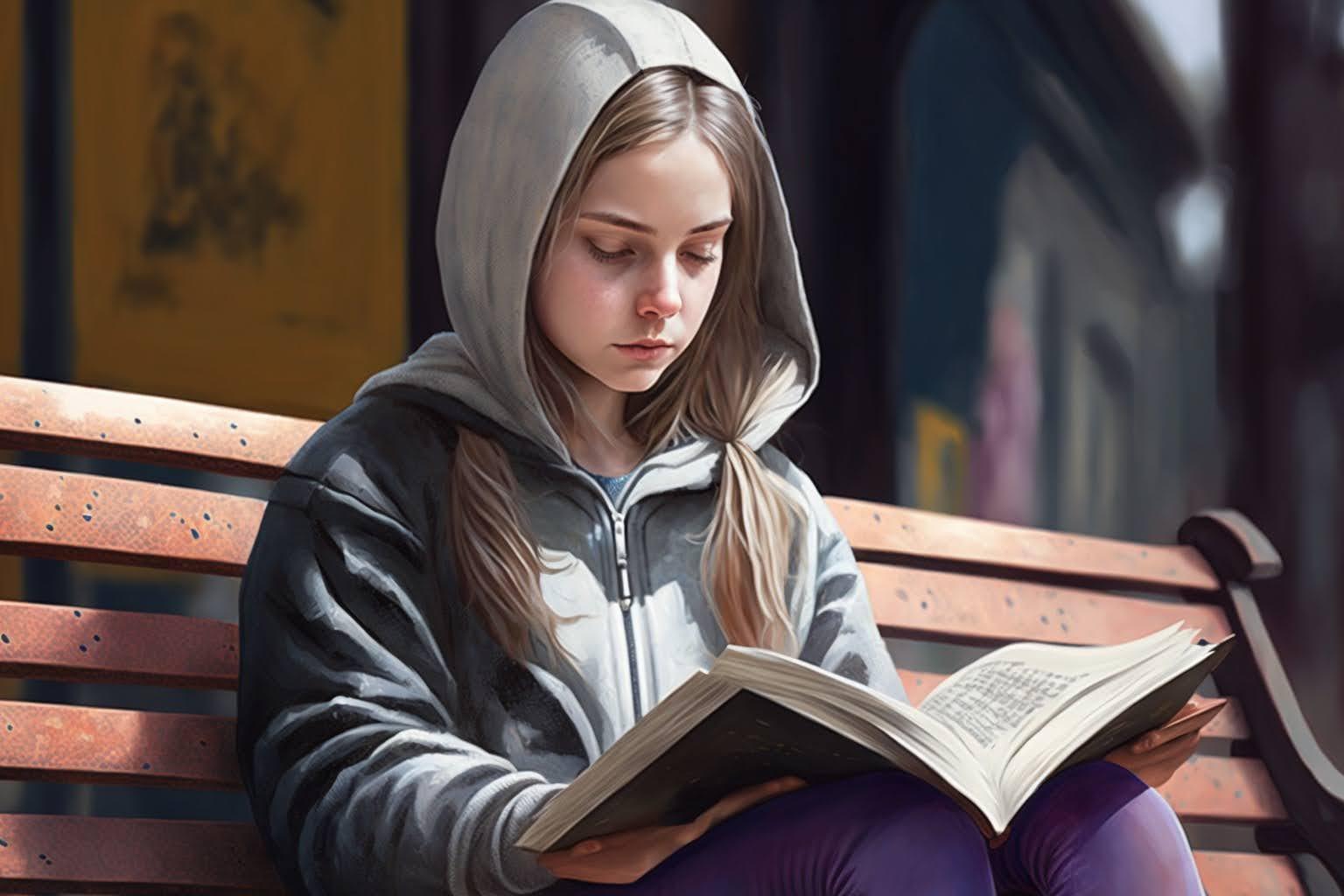
She told him without raising her head from her book. “It’s Aunt Idle’s new pet bird. It’s quite a character.”
“What?”
“The noise, it’s from the bird. It’s been cracking nuts for the past twenty minutes. Hence the noise. And yes, it’s annoying as hell.”
She rose from the bench. “Your bear friend will be back quick I’m certain; it’s just a small boutique with some nice crystals, but mostly cheap orgonite new-agey stuff. Betsy only swears by that, protection for electromagnetic waves and stuff she says, but look around… we are probably got more at risk to be hit by Martian waves or solar coronal mass ejections that by the ones from the telecom tower nearby.”
Xavier didn’t know what to say, so he nodded and smiled. He felt a bit out of his element. When he looked around, the girl had already disappeared.
Now alone, he sat on the empty bench, stretched and yawned while trying to relax. It was so different from the anonymity in the city: less people here, but everything and everyone very tightly knit together, although they all seemed to irk and chafe at the thought.
The flapping of wings startled him.
“Hellooo.” The red parrot had landed on the backrest of the bench and dropped shells from a freshly cracked nut which rolled onto the ground.
Xavier didn’t think to respond; like with AL, sometimes he’d found using polite filler words was only projecting human traits to something unable to respond back, and would just muddle the prompt quality.
“So ruuuude.” The parrot nicked his earlobe gently.
“Ouch! Sorry! No need to become aggressive!”
“You arrrre one to talk. Rouge is on Yooour forehead.”
Xavier looked surprised at the bird in disbelief. Did the bird talk about the mirror test? “What sort of smart creature are you now?”
“Call meee Rose. Pretty Giiirl acceptable.”
Xavier smiled. The bird seemed quite fascinating all of a sudden.
It was strange, but the bird seemed left completely free to roam about; it gave him an idea.“Rose, Pretty Girl, do you know some nice places around you’d like to show me?”
“Of couuurse. Foôllow Pretty Girl.”
February 18, 2023 at 11:28 am #6551In reply to: Orbs of Madjourneys
Xavier had woken up in the middle of the night that felt surprisingly alive bursting with a quiet symphony of sounds from nocturnal creatures and nearby nature, painted on a canvas of eerie spacious silence.
It often took him a while to get accustomed to any new place, and it was not uncommon for him to have his mind racing in the middle of the night. Generally Brytta had a soothing presence and that often managed to nudge him back to sleep, otherwise, he would simply wake up until the train of thoughts had left the station.
It was beginning of the afternoon in Berlin; Brytta would be in a middle of a shift, so he recorded a little message for her to find when she would get back to her phone. It was funny to think they’d met thanks to Yasmin and Zara, at the time the three girls were members of the same photography club, which was called ‘Focusgroupfocus’ or something similar…
With that done, he’d turned around for something to do but there wasn’t much in the room to explore or to distract him sufficiently. Not even a book in the nightstand drawer. The decoration itself had a mesmerising nature, but after a while it didn’t help with the racing thoughts.He was tempted to check in the game — there was something satisfactory in finishing a quest that left his monkey brain satiated for a while, so he gave in and logged back in.

Completing the quest didn’t take him too long this time. The main difficulty initially was to find the portal from where his avatar had landed. It was a strange carousel of blue storks that span into different dimensions one could open with the proper incantation.
As usual, stating the quirk was the key to the location, and the carousel portal propelled him right away to Midnight town, which was clearly a ghost town in more ways than one. Interestingly, he was chatting on the side with Glimmer, who’d run into new adventures of her own while continuing to ask him what was up, and as soon as he’d reached Midnight town, all communication channels suddenly went dark. He’d laughed to himself thinking how frustrated Glimmer would have been about that. But maybe the game took care of sending her AI-generated messages simulating his presence. Despite the disturbing thought of having an AI generated clone of himself, he almost hoped for it (he’d probably signed the consent for this without realising), so that he wouldn’t have to do a tedious recap about all what she’d missed.
Once he arrived in the town, the adventure followed a predictable pattern. The clues were also rather simple to follow.
The townspeople are all frozen in time, stuck in their daily routines and unable to move on. Your mission is to find the missing piece of continuity, a small hourglass that will set time back in motion and allow the townspeople to move forward.
The clue to finding the hourglass lies within a discarded pocket watch that can be found in the mayor’s office. You must unscrew the back and retrieve a hidden key. The key will unlock a secret compartment in the town clock tower, where the hourglass is kept.
Be careful as you search for the hourglass, as the town is not as abandoned as it seems. Spectral figures roam the streets, and strange whispers can be heard in the wind. You may also encounter a mysterious old man who seems to know more about the town’s secrets than he lets on.
Evading the ghosts and spectres wasn’t too difficult once you got the hang of it. The old man however had been quite an elusive figure to find, but he was clearly the highlight of the whole adventure; he had been hiding in plain sight since the beginning of the adventure. One of the blue storks in the town that he’d thought had come with him through the portal was in actuality not a bird at all.
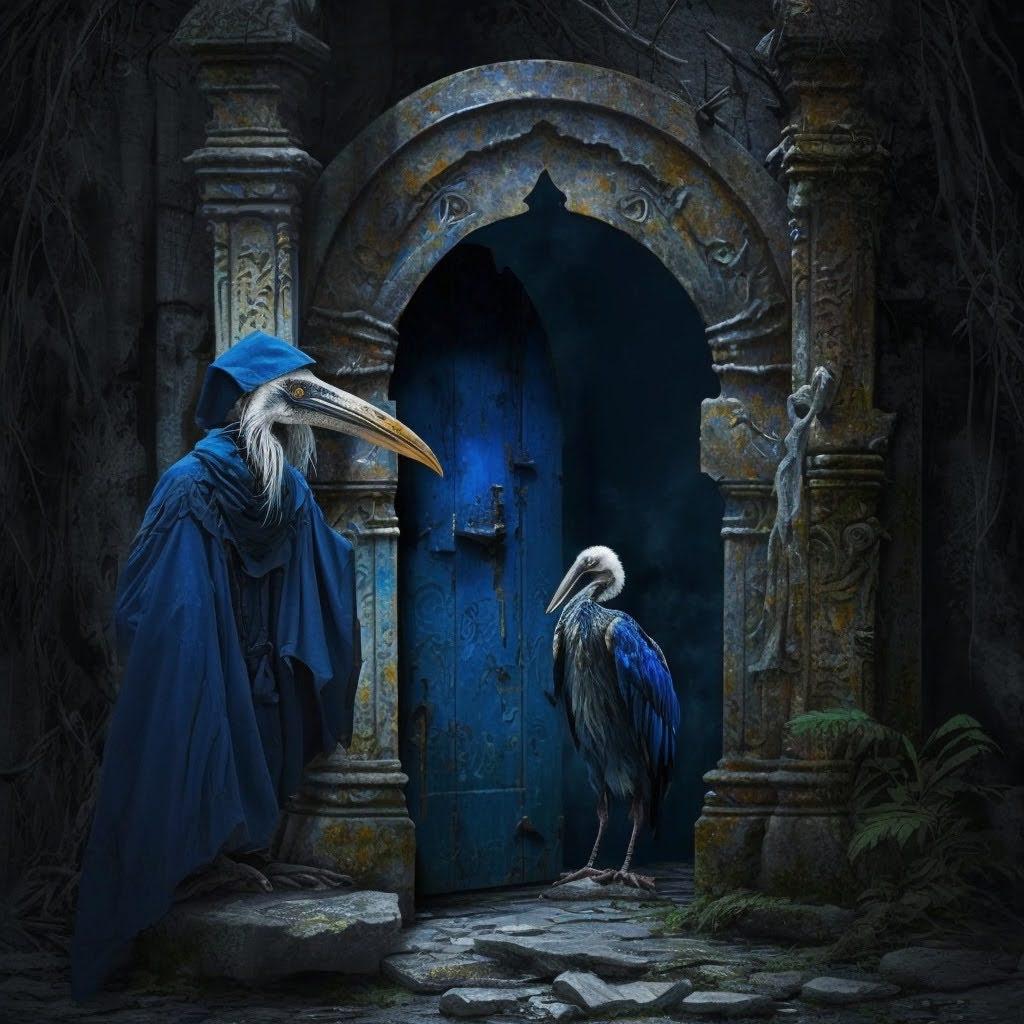

While he was focused on finishing the quest, the interaction with the hermit didn’t seem very helpful. Was he really from the game construct? When it was time to complete the quest and turn the hourglass to set the town back in motion, and resume continuity, some of his words came back to Xavier.
“The town isn’t what it seems. Recognise this precious moment where everything is still and you can realise it for the illusion that it is, a projection of your busy mind. When motion resumes, you will need to keep your mind quiet. The prize in the quest is not the completion of it, but the realisation you can stop the agitation at any moment, and return to what truly matters.”
The hermit had turned to him with clear dark eyes and asked “do you know what you are seeking in these adventures? do you know what truly matters to you?”

When he came out of the game, his quest completed, Xavier felt the words resonate ominously.
A buzz of the phone snapped him out of it.
It was a message from Zara. Apparently she’d found her way back to modernity.
[4:57] “Going to pick up Yasmin at the airport. You better sleep away the jetlag you lazy slugs, we have poultry damn plenty planned ahead – cackling bugger cooking lessons not looking forward to, but can be fun. Talk to you later. Z”
He had the impulse to go with her, but the lack of sleep was hitting back at him now, and he thought he’d better catch some so he could manage to realign with the timezone.
“The old man was right… that sounds like a lot of agitation coming our way…”
February 15, 2023 at 10:54 am #6547In reply to: Orbs of Madjourneys
On her way back to her room Zara picked up a leaflet off the hall table about the upcoming lager and cart race. Before starting the game she had a look through it.
The leaflet also mentioned the competition held annually each January in Port Lincoln. The Tunarama Festival was a competition to determine just how far a person could chuck a frozen tuna. A full-fledged celebration was centered around the event, complete with a wide array of arts and cultural displays, other participation events, local market stalls, and some of the freshest seafood in the world.
There was unlikely to be any fresh seafood at the local lager and cart races, but judging from the photos of previous events, it looked colourful and well worth sticking around for, just for the photo opportunities.
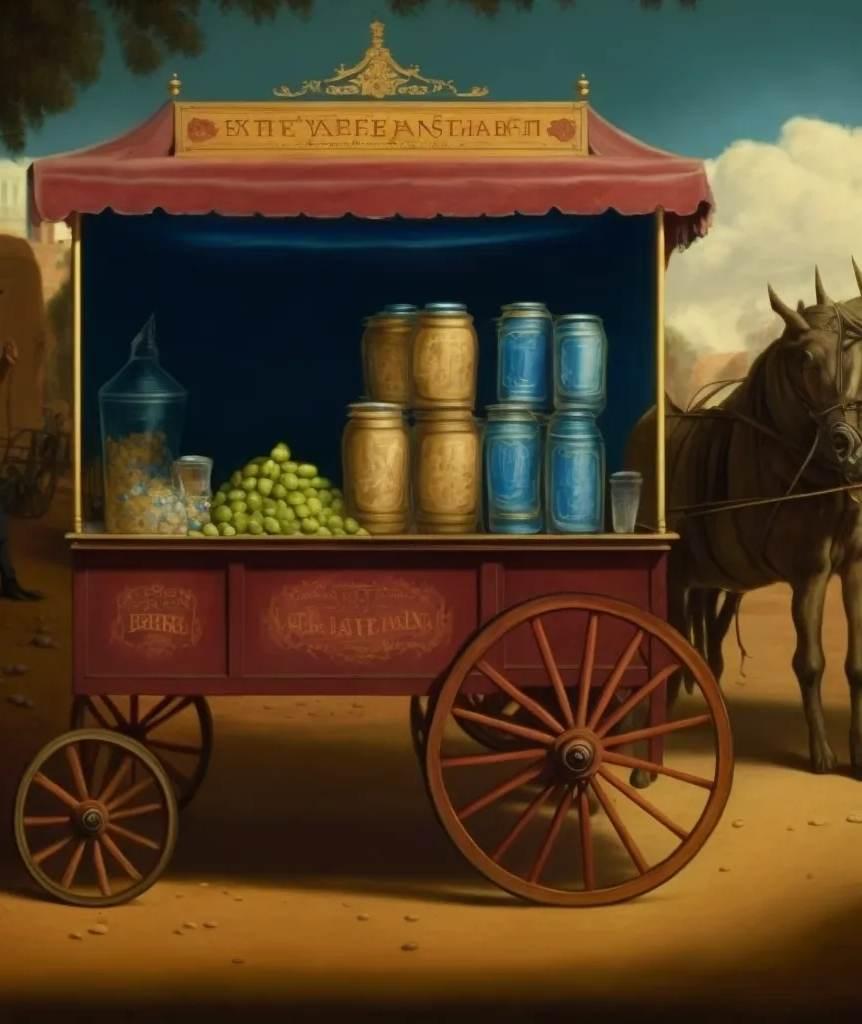
Apparently the lager and cart races had started during the early days of the settler mining, and most of the carts used were relics from that era. Competitors dressed up in costumes and colourful wigs, many of which were found in the abandoned houses of the local area.
“The miners were a strange breed of men, but not all cut from the same cloth ~ they were daring outsiders, game for anything, adventurous rule breakers and outlaws with a penchant for extreme experience. Thus, outlandish and adventurous women ~ and men who were not interested in mining for gold in the usual sense ~ were magnetically drawn to the isolated outpost. After a long dark day of restriction and confinement in the mines, the evenings were a time of colour and wild abandon; bright, garish, bizarre Burlesque events were popular. Strange though it may seem, the town had one of the most extensive wig and corset emporiums in the country, although it was discretely tucked away in the barn behind a mundane haberdashery shop.”
The idea was to fill as many different receptacles with lager as possible, piling them onto the gaily decorated carts pulled by the costume clad participants. As the carts were raced along the track, onlookers ran alongside to catch any jars or bottles that fell off the carts before they hit the ground. Many crashed to the ground and were broken, but if anyone caught one, they were obliged to drink the contents there and then before running after the carts to catch another one.
Members of the public were encouraged to attend in fancy dress costumes and wigs. There were plenty of stationary food vendors carts at the lager and cart races as well, and stalls and tents set up to sell trinkets.
February 14, 2023 at 12:23 pm #6544In reply to: Orbs of Madjourneys
Despite the late night and the abundance of wine, Zara awoke just after 6am as the sun was rising. It was too early to get up, but she desperately wanted a coffee. There was no sign of room service being available so she made her way quietly to the kitchen, hoping that someone would be up.
The strange child called Prune was sitting at the kitchen table eating rice crispies.
“Your friends are here,” she said, “But they went to bed before you came back. Late, weren’t you? Bert was cussing about you, you know, not letting him know.”
“Oh, terribly sorry,” Zara thought the child a tad impertinent. And was it really Bert’s place to be cussing about her, she was a guest after all. “Any chance of a cup of coffee? I’ll make it myself if you tell me where the things are.”
“Aunt Idle wasn’t bothered though,” Prune said, wiping some milk that had dribbled down her chin with the back of her hand. “But Bert said he didn’t want you to find it.”
“Find what?” The parrot had said the same thing.
“OBVIOUSLY I can’t tell you, can I? It’s a secret,” and with that Prune scraped her chair back, leaving her breakfast things on the table, and sauntered out of the kitchen in what could only be described as a cocky manner. Zara found what she needed to make coffee and made two cups and took them both back to her room. She had a couple of hours to play the game before breakfast and the reunion with her friends.
February 12, 2023 at 9:49 pm #6539In reply to: Prompts of Madjourneys
Zara is the main protagonist, and also the reluctant leader of the game. In RL, she is wandering off the trail nearby Arltunga, Australia, where she is visiting, staying at the small family run inn the Flying Fish Inn. Bert, the local handyman drove her there, told her specifically not to wander off, yet in search of where a mysterious compass she collected on the trail is leading, and egged on by her talking smart parrot “Beautiful Girl”, she goes off the trail to explore. The sun is still high, and she already started to hallucinate some hooded figures with blue frog-faces with jelly-bean carts.
Meanwhile, her friends Youssef and Xavier, just landed from abroad, are driving toward the rendez-vous spot at the Flying Fish Inn. The owners Mater and Idle don’t have any idea where Zara is.
Yasmin, the fourth friend in the group is still on her way from Fiji, bearing a message written in red on an envelope from a mysterious Fred, who we don’t know yet, but seems to be linked to Mater & Idle’s family.
What’s going to happen next to Zara? The game is encouraging her to explore her rudeness in a playful manner, in a medieval setting.
Provide a series of playful and fun actions for Zara, linking these contexts. You may incorporate Tiku, a wise and no-nonsense Aboriginal woman who may guide her though the Dreamtime challenges. Provide random keywords to each action in the list.Here is a list of playful and fun actions for Zara in the game:
- “Follow the Compass”: Zara can follow the mysterious compass she collected on the trail, as it leads her to new locations and challenges. Keywords: Adventure, Exploration, Mystery.
- “Converse with Beautiful Girl”: Zara’s talking smart parrot “Beautiful Girl” may provide humorous commentary and encouragement throughout her journey. Keywords: Humor, Personality, Support.
- “Solve Riddles with Tiku”: Tiku, the wise and no-nonsense Aboriginal woman, can guide Zara through the Dreamtime challenges. To do this, Tiku may present her with riddles or puzzles that she must solve to progress. Keywords: Wisdom, Intelligence, Spirituality.
- “Collect Items”: Zara can collect items along the way, such as artifacts or treasures that may help her in her journey or lead her to new discoveries. Keywords: Collection, Discovery, Help.
- “Play Music with Beautiful Girl”: Zara can play musical instruments with Beautiful Girl, creating an entertaining and musical interlude in her journey. Keywords: Music, Joy, Creativity.
- “Cook with Mater and Idle”: At the Flying Fish Inn, Zara can join Mater and Idle in the kitchen and help them cook traditional dishes from the region. Keywords: Cooking, Culture, Community.
- “Race with Youssef and Xavier”: Zara can engage in friendly races with Youssef and Xavier, such as foot races or cart races, as a way to pass the time and have fun. Keywords: Competition, Speed, Excitement.
These playful and fun actions can add variety and excitement to Zara’s journey and provide an opportunity for players to interact with the world and characters in new and unique ways.
🔁 Regenerate responseFebruary 11, 2023 at 10:10 pm #6538In reply to: The Jorid’s Travels – 14 years on
“That’s all Jorid had to say?” Georges mused at the sudden philosophical quote that read:
And doesn’t this point to something fundamentally tragic about our way of life? We live under an assumed identity, in a neurotic fairy tale world with no more reality than the Mock Turtle in Alice in Wonderland. Hypnotized by the thrill of building, we have raised the houses of our lives on sand. This world can seem marvelously convincing until death collapses the illusion and evicts us from our hiding place. What will happen to us then if we have no clue of any deeper reality? (The Tibetan Book of Living and Dying)
“I don’t know about this Mock Turtle, but those snapping sand ones that have been lurking about do look rather nasty. We shouldn’t waste any more time.”
Klatu opined “Klatu agrees with your female, sand turtle are lovely traps of death. Come with me now!” He intimated them to run into a sand opening he’d just made.
“Let me guess,” Georges said, “is it the equivalent of a Zathu prison? What powerful people could Léonard possibly have rubbed the wrong way this time?”
“Not prison.” Klatu commented “Death sentence.”
Salomé pointed out a glowing twirl of sand shaped as an ovoid form, inside which a human form could be discerned. “That would explain why he’s not more guarded…”
They approached carefully, expecting some extra booby trap, but nothing seemed to react to their presence, not even the moving sand egg.
“Let me guess,” Georges said, expecting a chorus
“DIMENSIONAL MAGIC!”
Klatu shushed them “Quiet stupids! Sound waves attract good turtles.”
“Is our friend OK? How do we break the spell?” Salomé asked Klatu. “Can you help?”
Klatu took a few minutes to inspect the shape, hopping carefully around it, and probing with soft whistling sounds.
“Friend in stasis for now. Kept fresh for questioning… possible.”
“Then we must hurry, how can we free him? Can I brute force this?” Georges asked, looking around for something to pierce the sand barrier and hook Léonard out of it.
“Only if you like sushi friend.” Klatu said, raising shoulders. “No finesse these primates.”
Klatu moved around the shape, taking some tools from his belt and making some elaborate plaits of sounds, as if trying to match the energy signature of the sand prison.
After a first belt of soundwaves was wrapped around, it seemed as though a first layer of the spell broke, and sand rained back into the external construct they were it. But a thin layer was still there, shifting and pulsating, almost clear as glass, and sharp as a razor blade.
“Crude encoding, but solid. Need more time.” Klatu seemed exhausted.
Georges was getting anxious for some activity. “Houses built on sand… Well I guess Jorid didn’t find the best quote to help…”
Salomé who was sitting cross-legged, trying for some time to connect to Léonard in his stasis, turned to Georges in disbelief. “Georges, you’re a genius!”
“What now?”
“Jorid gave us the last bit we needed. Until death collapses the illusion and evicts us from our hiding place. Remember? It’s risky but that could work!”
“Oh, I see what you’re thinking about. It’s mad, and it’s brilliant at the same time, how do we go about this?”
“I can’t reach Léonard, but maybe the both of us can.” Salomé joined hands with Georges.
“If he’s like anything I remember, he’d be in his mental palace, his workshop on the Duane… or in Marseille… or with Madame Jamelie…”
“Focus, Georges!”
“Duane it is, that’s where he did his best work.”
“We need to focus our energy to make him appear dead to the construct. It’ll be easier if we can locate precisely where his mind wanders.” Salomé said.
“He’ll be there, I know it. Let’s do this!”
The two of them joined hands and melded their minds, one as always, turning into a dark mirror of the abyss, bending light unto itself, leaving the void of creation at the place where Léonard was suspended.
Klatu looked at the scene suspiciously, but started to giggle as he saw the last layer he couldn’t open finally shatter and dissolve to the ground.
“Little apes full of surprises,… very awful, so very awful.” he said approvingly.
As his friends rushed to him, Léonard was on the ground, inert, but apparently alive.
February 11, 2023 at 9:16 am #6536In reply to: Orbs of Madjourneys
Youssef hadn’t changed a bit since they last met in real life. He definitely brought the bear in the bear hug he gave Xavier after Xavier had entered the soft sandal wood scented atmosphere of the Indian restaurant.
It was like there’d seen each other the day before, and conversation naturally flew without a thought on the few years’ hiatus between their last trip.
As they inquired about each other’s lives and events on the trip to get to Alice Springs, they ordered cheese nan, salted and mango lassi, a fish biryani and chicken tikka masala and a side thali for Youssef who was again ravenous after the jumpy ride. Soon after, the discussion turned to the road ahead.
“How long to the hostel?” asked Youssef, his mouth full of buns.
Xavier looked at his connected watch “It’s about 1 and half hour drive apparently. I called the number to check when to arrive, they told me to arrive before sunset… which I guess gives us 2-3 hours to visit around… I mean,” he looked at his friend “… we can also go straight there.”
Youssef nodded. He seemed to have had already enough of interactions in the past day.
Xavier continued “so it’s settled, we leave after we finish here. According to the landlady, it looks like Zara went off trekking, she didn’t seem too sure about Zara’s whereabouts. That would explain why we heard so little from her.”
Youssef laughed “If they don’t know Zara, I can bet they’ll be running around searching for her in the middle of the night.”
Xavier looked though the large window facing the street pensively. “I’m not sure I would want to get lost away from the beaten tracks here. There’s something so alien to the scale of it, and the dryness. Have you noticed we’re next to a river? I tried to have a look when I arrived, but it’s mostly dried up. And it’s supposed to be the wet season…”
Youssef didn’t reply, and turned to the leftovers of the biryani.
Despite the offering to top it off with gulab jamun and rose ice cream, it didn’t take too long to finish the healthy meal at the Indian restaurant. Youssef and Xavier went for the car.
“Here, catch!” Xavier threw the keys to Youssef. He knew his friend would have liked to drive; meanwhile he’d be able to catch on some emails and work stuff. After all, he was supposed to remote work for some days.
February 8, 2023 at 11:18 pm #6516In reply to: The Chronicles of the Flying Fish Inn
Aunt Idle:
Bert came barging in my room, and I’d only just sat down, telling me the guest still hadn’t phoned to be picked up from the trail. Bert, I said, she’ll be fine. She probably phoned a taxi and went to Alice for dinner or to meet her friends, she’s fine. But he kept going on about what if she wandered off the trail, and I said, Bert, if she wandered off the trail that doesn’t mean she’s in trouble, does it? Anyway, I said, the parrot said not to worry. Parrot? he said and his face was a picture. Parrot? The flaming parrot said not to worry? Not like old Bert to be as rude as he was then, I don’t know what had got into him.
He stomped off muttering and I caught a few words like sandwich short of a picnic, but I’m used to that now, they’re all rude about me. Well Bert not so much, which is why it took me by surprise, and the twins are alright. Mater though, don’t even get me started, nor Finly. Prune’s up to something, I don’t know what, and so is Devan. I can’t put my finger on it. And something’s rattled Berts cage.
She’s nice, the new guest, a bit younger than me but struth! looks about 20 years younger. Living out here hasn’t done me any favours.
February 6, 2023 at 10:44 pm #6500More developments
Chapter 3: The Journey becomes more eggciting
The Flovlinden Tree
The group reaches the Flovlinden Tree, a massive linden tree in the heart of Oocrane, which is said to be sacred and is attracting crowds of pilgrims.
They meet Olek, the old caretaker of the tree, who tells them the story of Saint Edigna. He explains how the tree is said to have magical healing properties, and how the tree is responsible for the sacred oil that the pilgrims come to collect.
However, Olek reveals that the secret of Saint Edigna is not what it seems. Edna, an old woman who has been living far from the crowd for thousands of years, is actually Saint Edigna.
Olek shares that Edna has been living in solitude for very long. He tells the group that if they want to learn more about the sacred tree and Edna, they must travel to her hidden home.
The four friends were shocked to hear that Edna was still alive and wanted to meet her. They asked Olek for directions, and he gave them a map that showed the way to Edna’s remote dwelling.
They bid farewell to Olek and set off on their journey to find Edna.A Run-In with Myroslava
The group comes across a former war reporter, Myroslava, who is traveling on her own after leaving a group of journalists. She is being followed by mysterious individuals and is trying to lose them by hunting and making fire in bombed areas.
Myroslava is frustrated and curses her lack of alcohol, wishing she could find a place to escape from her pursuers.
The group approaches Myroslava and offers to help her. She joins forces with them and together, they set off on their journey.
As they travel, Myroslava shares her experiences as a war reporter, and the group listens in awe. She explains how she has seen the worst of humanity, but also the best, and how it has changed her as a person.
Myroslava and the group continue their journey, with the former reporter becoming more and more determined to shake off her pursuers and continue on her own.A Visit with Eusebius Kazandis’ Relatives
The group reaches a small village where they are expected by relatives of Eusebius Kazandis, the cauldron seller that Rose has met at the Innsbruck fair.
The relatives tell the group about Kazandis and his business, and how he has been traveling the world, selling his wares. They explain how he has become a legend in their village, and how proud they are of him.
The group learns about Kazandis’ passion for cooking and how he uses his cauldrons to create delicious meals for his customers. They are also shown his secret recipe book, which has been passed down for generations.
The relatives invite the group to try some of Kazandis’ famous dishes, and they are blown away by the delicious flavors.
The group thanks the relatives for their hospitality and sets off on their journey, with a newfound appreciation for Kazandis and his love of cooking.A Surprising Encounter with Edna
The group finally reaches Edna’s hidden home, a small cottage in the middle of a dense forest.
As they approach the cottage, they are surprised to see Edna, who is actually the legendary Saint Edigna, standing outside, waiting for them.The four friends have finally arrived at Edna’s dwelling, where they learned about her vast knowledge of the families connected to her descendants. Edna showed them her books, and they were amazed to find that their own family was listed among her descendants. They were even more shocked to learn that they were related to President Voldomeer Zumbasky and Dumbass Voldomeer, who was said to be a distant relative and carpenter who made the President’s wooden leg. It was rumored that they shared a common ancestor, but in reality, they were possibly secret twins.
The Secret of Dumbass Voldomeer
The four friends were determined to find out more about Dumbass Voldomeer and his connection to their family. They learned that he lived in the small city of Duckailingtown in Dumbass, near the Rootian border. They also discovered that Dumbass Voldomeer had been enrolled to take the place of the President, who had succumbed from a mysterious swan flu virus, to which Dumbass Voldomeer was immune. As they set to Duckailingtown, they couldn’t help but wonder what other secrets and surprises lay ahead for them on this incredible journey.
February 2, 2023 at 9:10 pm #6492In reply to: Orbs of Madjourneys
With a determined glint in his eye, Xavier set his sights on the slot machines. He scanned the rows of blinking lights and flashing screens until one caught his attention. He approached the machine and inserted a coin, feeling a rush of excitement as he pulled the lever.
With a satisfying whir, the reels began to spin, and before he knew it, the golden banana appeared on the screen, lining up perfectly. The machine erupted in flashing lights and loud noises, and a ticket spilled out onto the floor.
🎰 · 💰
🍌🍌🍌Xavier picked it up, reading aloud the inscriptions on the ticket, “Congratulations on completing your quest. You may enjoy your trip until the next stage of your journey. Look for the cook on the pirate boat, she will give you directions to regroup with your friends. And don’t forget to confirm your bookings.”
Glimmer let out a whoop of trepidation, “Let’s go find that cook, Xav! I can’t wait to see what’s next in store for us!”
But Xavier, feeling a bit worn out, replied with a smile, “Hold on a minute, love. All I need at the moment is just some R&R after all that brouhaha.”
Glimmer nodded in understanding and they both made their way to the deck, taking in the fresh air and the breathtaking scenery as the boat sailed towards its next destination.
As the boat continued its journey, sailing and gliding on the river in the air filled with moist, they could start to see across the mist opening like a heavy curtain a colourful floating market in the distance, and the sounds of haggling and laughter filled the air.
They couldn’t wait to explore and see what treasures and surprises awaited them. The journey was far from over, but for now, they were content to simply enjoy the ride.

Xavier closed his laptop while his friends were still sending messages on the chatroom. He’d had long days of work before leaving to take his flights to Australia, during which he hoped he could rest enough during the flights.
Most of the flights he’d checked had a minimum of 3 layovers, and a unbelievably long durations (not to count the astronomic amount of carbon emissions). Against all common sense, he’d taken one of the longest flight duration. It was 57h, but only 3 layovers. From Berlin, to Stockholm, then Dubai and Sydney. He could probably catch up with Youssef there as apparently he sent a message before boarding. They could go to Alice Spring and the Frying Mush Inn together. He’d try to find the reviews, but they were only listed on boutiquehotelsdownunder.com and didn’t have the rave reviews of the prestigious Kookynie Grand Hotel franchise. God knows what Zara had in mind while booking this place, it’d better be good. Reminded him of the time they all went to that improbably ghastly hotel in Spain (at the time Yasmin was still volunteering in a mission and couldn’t join) for a seminar with other game loonies and cosplayers. Those were the early days of the game, and the technology frankly left a lot to be desired at the time. They’d ended up eating raspberry jam with disposable toothbrushes, and get drunk on laughter.
When Brytta had seen the time it took to go there, she’d reconsidered coming. She couldn’t afford taking that much time off, and spending the equivalent of 4 full days of her hard-won vacation as a nurse into a plane simply for the round-trip —there was simply no way.
Xavier had proposed to shorten his stay, but she’d laughed and said, “you go there, I’ll enjoy some girl time with my friends, and I’ll work on my painting” —it was more convenient when he was gone for business trips, she would be able to put all the materials out, and not care to keep the apartment neat and tidy.The backpack was ready with the essentials; Xavier liked to travel light.
February 2, 2023 at 2:34 pm #6490In reply to: Orbs of Madjourneys
Youssef gave his passport and ticket to the woman at gate 11. He was followed closely by Kyle and other members of the team. The flight attendant looked at him and gave him his passport and ticket back without scanning them with her machine.
“I’m sorry, you’re at the wrong gate. Your flight is at gate 8,” she said.
“But I’m going to Boston. My ticket says gate 11.”
Youssef showed his ticket to the hostess, and she pointed the destination and the gate to him. She was right.
“Your ticket is for flight AL357 to Sydney. It’s currently boarding at gate 8. Next person please.”
Kyle patted him on the shoulder.
“You should have double checked your ticket, he said.”
“What’s wrong? asked Miss Tartiflate. Why are you going to Australia?”
“I’m not.”
“Well, it says you are,” she said pointing at the ticket. He didn’t understand the dark intensity of her gaze and her clenched fist, until he remembered that Botty Banworth lived there.
“I’m not… I mean…”
“You better not. If I hear you were in with that…”
The words got lost as they broadcasted a call for flight AL357 to Sydney at Gate 8.
“You’d better get that f…ing BLOG running during your little vacation or you can stay there and forget about your job,” she said before bumping into the border of the gate.
Youssef moved on the side and looked at his ticket to Sydney, puzzled. When he passed security his ticket was to Boston. He recalled a message from Zara saying she would meet them in Australia soon. But how could she have managed to change his ticket without his knowing.
Sure there was that moment when he had left his passport with his ticket on the table at the Starmoose when going back to the counter pick his second slice of cinnamon apple tart. But he was looking away only for a few seconds.
“This is the last call for flight AL357 to Sydney. Youssef Ali is requested at Gate 8 before we close the gate.”
“Let’s just hope whomever made the change thought about transferring my luggage to the right plane,” he said as he started walking to Gate 8 with his bag.
February 2, 2023 at 8:09 am #6489In reply to: Orbs of Madjourneys
It was a pleasant 25 degrees as Zara stepped off the plane. The flat red land stretched as far as the eye could see, and although she prefered a more undulating terrain there was something awe inspiring about this vast landscape. It was quite a contrast from the past few hours spent inside mine tunnels.
Bert, a weatherbeaten man of indeterminate advanced age, was there to meet her as arranged and led her to the car, a battered old four wheel drive. Although clearly getting on in years, he was tall and spry and dressed in practical working clothes.
“Welcome to Alice,” he said, taking her bag and putting in on the back seat. “I expect you’ll be wanting to know a bit about the place.”
“How long have you lived here?” Zara asked, as Bert settled into the creaky drivers seat and started the car.
Bert gave her a funny look and replied “Longer than a ducks ass.” Zara had never heard that expression before; she assumed it meant a long time but didn’t like to pursue the question.
“All this land belongs to the Arrernte,” he said, pronouncing it Arrunda. “The local aboriginals. 1862 when we got here. Well,” Bert turned to give Zara a lopsided smile, “Not me personally, I aint quite that old.”
Zara chuckled politely as Bert continued, “It got kinda busy around these parts round 1887 with the gold.”
“Oh, are there mines near here?” Zara asked with some excitement.
Bert gave her a sharp look. “Oh there’s mines alright. Abandoned now though, and dangerous. Dangerous places, old mines. You’ll be more interested in the hiking trails than those old mines, some real nice hiking and rock gorges, and it’s a nice temperature this time of year.”
Bert lapsed into silence for a few minutes, frowning.
“If you’da been arriving back then, you’da been on a camel train, that’s how they did it back then. Camel trains. They do camel tours for tourists nowadays.”
“Do you get many tourists?”
“Too dang many tourists if you ask me, Alice is full of them, and Ayers Rock’s crawling with ’em these days. We don’t get many out our way though.” Bert snorted, reminding Zara of Yasmin. “Our visitors like an off the beaten track kind of holiday, know what I mean?” Bert gave Zara another sideways lopsided smile. “I reckon you’ll like it at The Flying Fish Inn. Down to earth, know what I mean? Down to earth and off the wall.” He laughed heartily at that and Zara wasn’t quite sure what to say, so she laughed too.
“Sounds great.”
“Family run, see, makes a difference. No fancy airs and graces, no traffic ~ well, not much of anything really, just beautiful scenery and peace and quiet. Aunt Idle thinks she’s in charge but me and old Mater do most of it, well Finly does most of it to be honest, and you dropped lucky coming now, the twins have just decorated the bedrooms. Real nice they look now, they fancied doing some dreamtime murials on the walls. The twins are Idle’s neices, Clove and Corrie, turned out nice girls, despite everything.”
“Despite ….?”
“What? Oh, living in the outback. Youngsters usually leave and head for the cities. Prune’s the youngest gal, she’s a real imp, that one, a real character. And Devan calls by regular to see Mater, he works at the gas station.”
“Are they all Idle’s neices and nephews? Where are their parents?” Perhaps she shouldn’t have asked, Zara thought when she saw Bert’s face.
“Long gone, mate, long since gone from round here. We’ve taken good care of ’em.” Bert turned off the road onto a dirt road. “Only another five minutes now. We’re outside the town a bit, but there aint much in town anyway. Population 79, our town. About right for a decent sized town if you ask me.”
Bert rounded a bend in a eucalyptus grove and announced, “Here we are, then, the Flying Fish Inn.” He parked the car and retrieved Zara’s bag from the back seat. “Take a seat on the verandah and I’ll find Idle to show you to your room and get you a drink. Oh, and don’t be put off by Idle’s appearance, she’s a sweetheart really.”
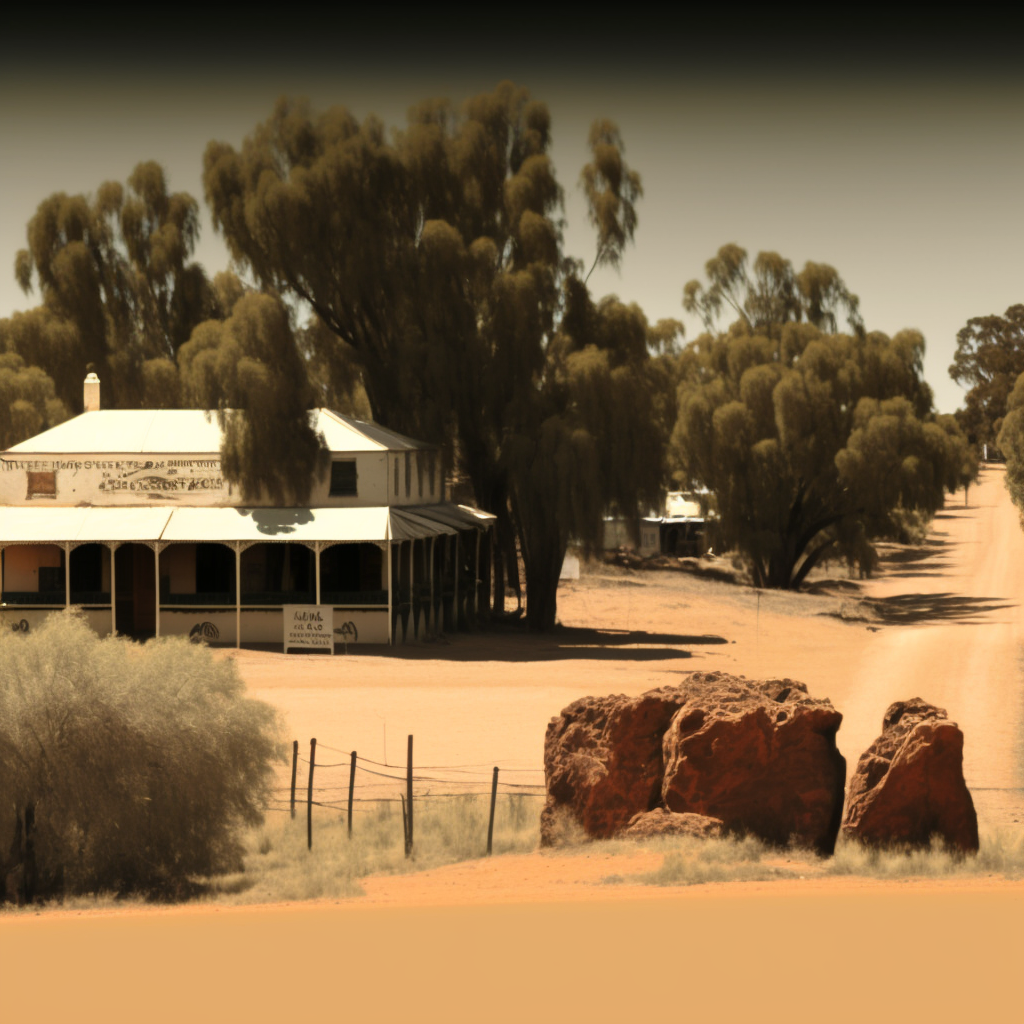
Aunt Idle was nowhere to be found though, having decided to go for a walk on impulse, quite forgetting the arrival of the first guest. She saw Bert’s car approaching the hotel from her vantage point on a low hill, which reminded her she should be getting back. It was a lovely evening and she didn’t rush.

Bert found Mater in the dining room gazing out of the window. “Where the bloody hell is Idle? The guest’s outside on the verandah.”
“She’s taken herself off for a walk, can you believe it?” sighed Mater.
“Yep” Bert replied, “I can. Which room’s she in? Can you show her to her room?”
“Yes of course, Bert. Perhaps you’d see to getting a drink for her.”
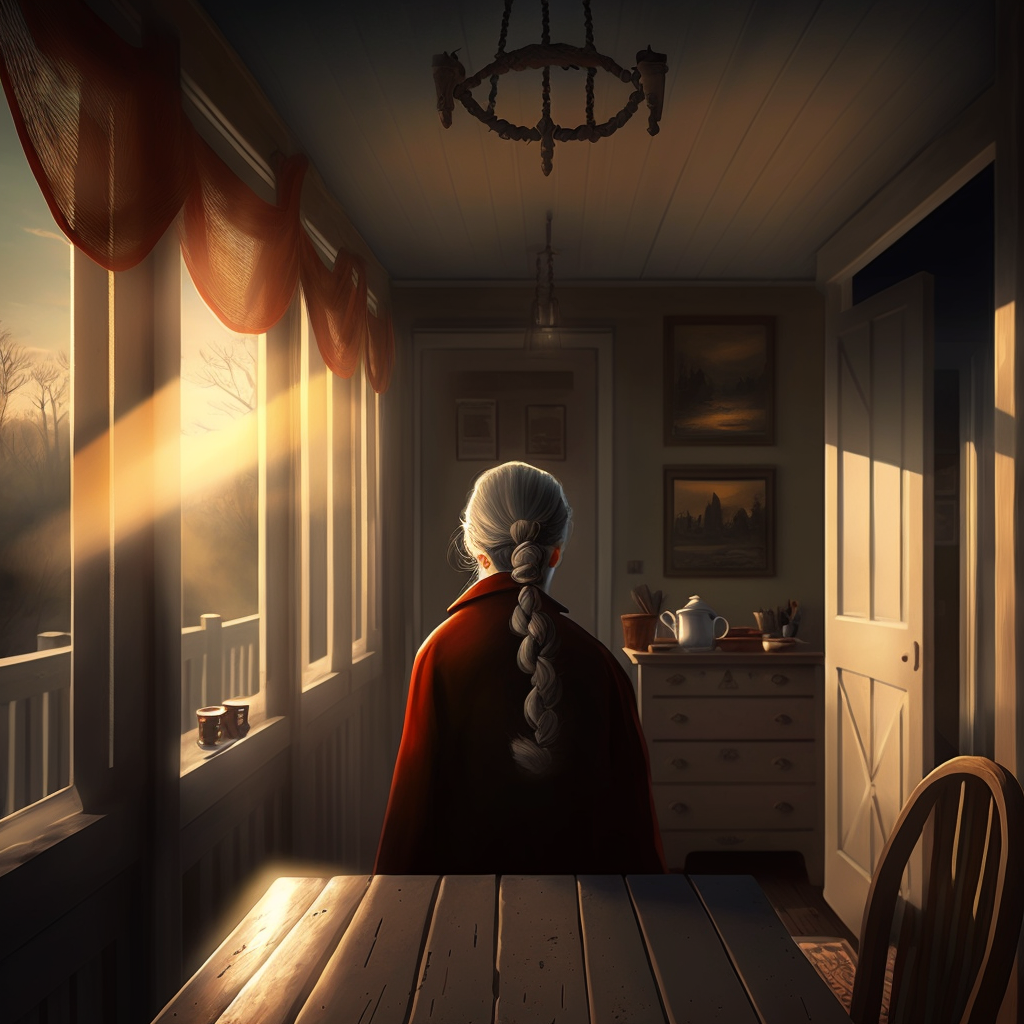 February 1, 2023 at 12:57 pm #6487
February 1, 2023 at 12:57 pm #6487In reply to: The Chronicles of the Flying Fish Inn
I’ve always felt like the odd one out in my family. Growing up at the Flying Fish Inn, I’ve always felt like I was on the outside looking in. My mother left when I was young, and my father disappeared not long after. I’ve always felt like I was the only one who didn’t fit in with the craziness of my family.
I’ve always tried to keep my distance with the others. I didn’t want to get too involved, take sides about petty things, like growing weed in the backyard, making psychedelic termite honey, or trying to influence the twins to buy proper clothes. But truth is, you can’t get too far away. Town’s too small. Family always get back to you, and manage to get you involved in their shit, one way or another, even if you don’t say anything. That’s how it works. They don’t need my participation to use me as an argument.
So I stopped paying attention, almost stopped caring. I lived my life working at the gas station, and drinking beers with my buddies Joe and Jasper, living in a semi-comatose state. I learned that word today when I came bringing little honey buns to mater. I know she secretly likes them, even if she pretend she doesn’t in front of Idle. But I can see the breadcrumbs on her cardigan when I come say hi at the end of the day. This morning, Idle was rocking in her favourite chair on the porch, looking at the clouds behind her mirrored sunglasses. Prune was talking to her, I saw she was angry because of the contraction of the muscles of her jaw and her eyes were darker than usual. She was saying to Idle that she was always in a semi-comatose state and doing nothing useful for the Inn when we had a bunch of tourists arriving. And something about the twins redecorating the rooms without proper design knowledge. Idle did what she usually does. She ignored the comment and kept on looking at the clouds. I’m not even sure she heard or understood that word that Prune said. Semi-comatose. It sounds like glucose. That’s how I’m spending my life between the Inn, the gas station and my buddies.
But things changed today when I got back to my apartment for lunch. You can call it a hunch or a coincidence. But as we talked with Joe about that time when my dad left, making me think we were doing hide and seek, and he left me a note saying he would be back someday. I don’t know why I felt the need to go search that note afterwards. So I went back to the apartment and opened the mailbox. Among the bills and ads, I found a postcard with a few words written on the image and nothing except my address on the back. I knew it was from my dad.
It was not signed or anything, but still I was sure it was his handwriting. I would recognise it anywhere. I went and took the shoebox I keep hidden on top of the kitchen closet, because I saw people do that in movies. That’s not very original, I know, but I’m not too bright either. I opened the box and took the note my dad left me when he disappeared.
 I put the card on the desk near the note. The handwritings matched. I felt so excited, and confused.
I put the card on the desk near the note. The handwritings matched. I felt so excited, and confused.A few words at the bottom of the card said : “Memories from the coldest place on Earth…”
Why would dad go to such a place to send me a postcard after all those years ? Just to say that.
That’s when I recalled what Prune had told me once as we were watching a detective movie : “Read everything with care and always double check your information.”
On the back, it said that the image was from a scientific station in Antartica, but the stamp indicated it had been posted from a floating post office in the North Pole. I turned the card and looked at the text again. Above the station, a few words were written that sounded like a riddle.
> A mine, a tile, dust piled high,
Together they rest, yet always outside.
One misstep, and you’ll surely fall,
Into the depths, where danger lies all.It sure sounds like a warning. But I’m not too good with riddles. No need to worry Mater about that, in case of false hope and all that. Idle ? Don’t even think about it. She won’t believe me when I say it’s from dad. She never does believe me. And she’ll keep playing with the words trying to find her answer in the shape of smoke. The twins, they are a riddle on their own.
No. It’s Prune’s help I need.
February 1, 2023 at 8:54 am #6483In reply to: Prompts of Madjourneys
Zara: Create a surreal and dreamlike digital art piece that combines elements of traditional aboriginal native art with a map to a secret and special place, featuring the otherworldly dreamscape of Dream Time. The image should depict a series of mine tunnels, each leading to gorgeous discoveries and wonders, and the overall scene should be filled with the mysticism and magic of the Dream Time. Don’t be afraid to let your imagination run wild and include random elements that add to the surreal quality of the piece.
January 26, 2023 at 12:16 am #6460In reply to: Orbs of Madjourneys
The vendor was preparing the Lorgh Drülp with the dexterity of a Japanese sushi chef. A piece of yak, tons of spices, minced vegetables, and some other ingredients that Youssef couldn’t recognise. He turned his attention to the shaman’s performance. The team was trying to follow the man’s erratic moves under Miss Tartiflate’s supervision. Youssef could hear her shouting to Kyle to get closer shots. It reminded him that he had to get an internet connection.
“Is there a wifi?” asked Youssef to the vendor. The man bobbed his head and pointed at the table with a knife just as big as a machete. Impressed by the size of the blade, Youssef almost didn’t see the tattoo on the vendor’s forearm. The man resumed his cooking swiftly and his long yellow sleeve hid the tattoo. Youssef touched his screen to look at his exchange with Xavier. He searched for the screenshot he had taken of the Thi Gang’s message. There it was. The mummy skull with Darth Vador’s helmet. The same as the man’s tattoo. Xavier’s last message was about the translation being an ancient silk road recipe. They had thought it a fluke in AL’s algorithm. Youssef glanced at the vendor and his knife. Could he be part of Thi Gang?
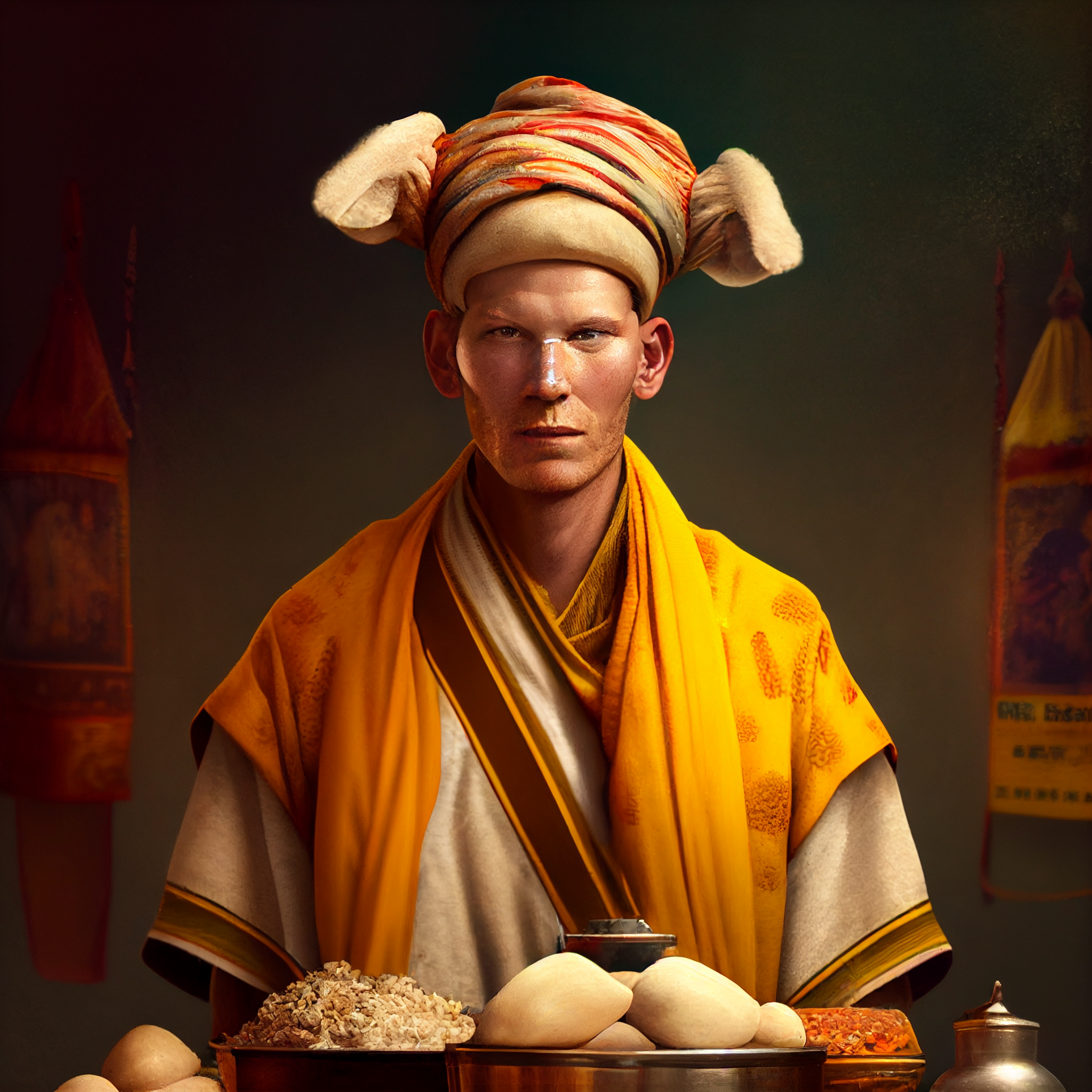
Youssef didn’t have time to think of a plan when the vendor put a tray with the Lorgh Drülp and little balls of tsampa on the table. The man pointed with his finger at the menu on the table, uncovering his forearm, it was the same as the Thi Gang logo.
“Wifi on menu,” the man said. “Tsampa, good for you…”
A commotion at the market place interrupted them. Apparently Kyle had gone too close and the shaman had crashed into him and the rest of the team. The man was cursing every one of them and Miss Tartiflate was apparently trying to calm him down by offering him snack bars. But the shaman kept brandishing an ugly sceptre that looked like a giant chicken foot covered in greasy fur, while cursing them with broken english. The tourists were all brandishing their phones, not missing a thing, ready to send their videos on TrickTruck. The shaman left angrily, ignoring all attempts at conciliation. There would be no reportage.
“Hahaha, tourists, they believe anything they see,” said the vendor before returning to his stove and his knife.

Despite his hunger, Youssef thought he’d better hurry with the wifi, now that the crew was out of work, he would be the target of Miss Tartiflate’s frustration. Furthermore, he wanted to lay low and not attract the vendor’s attention.
3235 messages from his friends. How would he ever catch up?
Among them, messages from Xavier. Youssef sighed of relief when he read that his friend had regained full access of the website and updated the system to fix a security flaw that allowed Thi Gang to gain access in the first place. But he growled when his friend continued with the bad news. There was some damage done to the content of THE BLOG.To console himself, Youssef started to eat a ball of tsampa. It was sweet and tasted like rose. He took a second and spit it out almost immediately. There was a piece of paper inside. He smoothed it and discovered a series of five pictograms.
🧔🌮🔍🔑🏞️
The first one was like a hologram and kept changing into six horizontal bars. The second one, looking like a tako bell, kept reversing side. Youssef raised his head to call the vendor and nobody was there. He got up and looked for the guy, Thi Gang or not, he needed some answers. Voices came from behind the curtain at the back of the stall. Youssef walked around the stall and saw the shaman and the vendor exchanging clothes. The caucasian man was now wearing the colourful costume and the drum. When he saw Youssef, he smiled and waved his hand, making the bells from the hem ring. Then he turned around and left, whistling an air that sounded strangely like the music of the Game. Youssef was about to run after him when a hand grasped his shirt.
“Please! Tell me at least that THE BLOG is up and running!” said an angry voice.
January 23, 2023 at 10:28 pm #6454In reply to: Prompts of Madjourneys
YASMIN’S QUIRK: Entry level quirk – snort laughing when socially anxious
Setting
The initial setting for this quest is a comedic theater in the heart of a bustling city. You will start off by exploring the different performances and shows, trying to find the source of the snort laughter that seems to be haunting your thoughts. As you delve deeper into the theater, you will discover that the snort laughter is coming from a mischievous imp who has taken residence within the theater.
Directions to Investigate
Possible directions to investigate include talking to the theater staff and performers to gather information, searching backstage for clues, and perhaps even sneaking into the imp’s hiding spot to catch a glimpse of it in action.
Characters
Possible characters to engage include the theater manager, who may have information about the imp’s history and habits, and a group of comedic performers who may have some insight into the imp’s behavior.
Task
Your task is to find a key or tile that represents the imp, and take a picture of it in real life as proof of completion of the quest. Good luck on your journey to uncover the source of the snort laughter!
THE SECRET ROOM AND THE UNDERGROUND MINES
1st thread’s answer:
As the family struggles to rebuild the inn and their lives in the wake of the Great Fires, they begin to uncover clues that lead them to believe that the mines hold the key to unlocking a great mystery. They soon discover that the mines were not just a source of gold and other precious minerals, but also a portal to another dimension. The family realizes that Mater had always known about this portal, and had kept it a secret for fear of the dangers it posed.
The family starts to investigate the mines more closely and they come across a hidden room off Room 8. Inside the room, they find a strange device that looks like a portal, and a set of mysterious symbols etched into the walls. The family realizes that this is the secret room that Mater had always spoken about in hushed tones.
The family enlists the help of four gamers, Xavier, Zara, Yasmin, and Youssef, to help them decipher the symbols and unlock the portal. Together, they begin to unravel the mystery of the mines, and the portal leads them on an epic journey through a strange and fantastical alternate dimension.
As they journey deeper into the mines, the family discovers that the portal was created by an ancient civilization, long thought to be lost to history. The civilization had been working on a powerful energy source that could have changed the fate of humanity, but the project was abandoned due to the dangers it posed. The family soon discovers that the civilization had been destroyed by a powerful and malevolent force, and that the portal was the only way to stop it from destroying the world.
The family and the gamers must navigate treacherous landscapes, battle fierce monsters, and overcome seemingly insurmountable obstacles in order to stop the malevolent force and save the world. Along the way, they discover secrets about their own past and the true origins of the mines.
As they journey deeper into the mines and the alternate dimension, they discover that the secret room leads to a network of underground tunnels, and that the tunnels lead to a secret underground city that was built by the ancient civilization. The city holds many secrets and clues to the fate of the ancient civilization, and the family and the gamers must explore the city and uncover the truth before it’s too late.
As the story unfolds, the family and the gamers must come to grips with the truth about the mines, and the role that the family has played in the fate of the world for generations. They must also confront the demons of their own past, and learn to trust and rely on each other if they hope to save the world and bring the family back together.
second thread’s answer:
As the 4 gamers, Xavier, Zara, Yasmin and Youssef, arrived at the Flying Fish Inn in the Australian outback, they were greeted by the matriarch of the family, Mater. She was a no-nonsense woman who ran the inn with an iron fist, but her tough exterior hid a deep love for her family and the land.
The inn was run by Mater and her daughter Dido, who the family affectionately called Aunt Idle. She was a free spirit who loved to explore the land and had a deep connection to the local indigenous culture.
The family was made up of Devan, the eldest son who lived in town and helped with the inn when he could, and the twin sisters Clove and Coriander, who everyone called Corrie. The youngest was Prune, a precocious child who was always getting into mischief.
The family had a handyman named Bert, who had been with them for decades and knew all the secrets of the land. Tiku, an old and wise Aborigine woman was also a regular visitor and a valuable source of information and guidance. Finly, the dutiful helper, assisted the family in their daily tasks.
As the 4 gamers settled in, they learned that the area was rich in history and mystery. The old mines that lay abandoned nearby were a source of legends and stories passed down through the generations. Some even whispered of supernatural occurrences linked to the mines.
Mater and Dido, however, were not on good terms, and the family had its own issues and secrets, but the 4 gamers were determined to unravel the mystery of the mines and find the secret room that was said to be hidden somewhere in the inn.
As they delved deeper into the history of the area, they discovered that the mines had a connection to the missing brother, Jasper, and Fred, the father of the family and a sci-fi novelist who had been influenced by the supernatural occurrences of the mines.
The 4 gamers found themselves on a journey of discovery, not only in the game but in the real world as well, as they uncovered the secrets of the mines and the Flying Fish Inn, and the complicated relationships of the family that ran it.
THE SNOOT’S WISE WORDS ON SOCIAL ANXIETY
Deear Francie Mossie Pooh,
The Snoot, a curious creature of the ages, understands the swirling winds of social anxiety, the tempestuous waves it creates in one’s daily life.
But The Snoot also believes that like a Phoenix, one must rise from the ashes, and embrace the journey of self-discovery and growth.
It’s important to let yourself be, to accept the feelings as they come and go, like the ebb and flow of the ocean. But also, like a gardener, tend to the inner self with care and compassion, for the roots to grow deep and strong.The Snoot suggests seeking guidance from the wise ones, the ones who can hold the mirror and show you the way, like the North Star guiding the sailors.
And remember, the journey is never-ending, like the spiral of the galaxy, and it’s okay to take small steps, to stumble and fall, for that’s how we learn to fly.The Snoot is here for you, my dear Francie Mossie Pooh, a beacon in the dark, a friend on the journey, to hold your hand and sing you a lullaby.
Fluidly and fantastically yours,
The Snoot.
January 23, 2023 at 4:14 pm #6453In reply to: Orbs of Madjourneys
 Each group of people sharing the jeeps spent some time cleaning the jeeps from the sand, outside and inside. While cleaning the hood, Youssef noted that the storm had cleaned the eagles droppings. Soon, the young intern told them, avoiding their eyes, that the boss needed her to plan the shooting with the Lama. She said Kyle would take her place.
Each group of people sharing the jeeps spent some time cleaning the jeeps from the sand, outside and inside. While cleaning the hood, Youssef noted that the storm had cleaned the eagles droppings. Soon, the young intern told them, avoiding their eyes, that the boss needed her to plan the shooting with the Lama. She said Kyle would take her place.“Phew, the yak I shared the yurt with yesterday smelled better,” he said to the guys when he arrived.
Soon enough, Miss Tartiflate was going from jeep to jeep, her fiery hair half tied in a bun on top of her head, hurrying people to move faster as they needed to catch the shaman before he got away again. She carried her orange backpack at all time, as if she feared someone would steal its content. Rumour had it that it was THE NOTEBOOK where she wrote the blog entries in advance.
“No need to waste more time! We’ll have breakfast at the Oasis!” she shouted as she walked toward Youssef’s jeep. When she spotted him, she left her right index finger as if she just remembered something and turned the other way.
“Dunno what you did to her, but it seems Miss Yeti is avoiding you,” said Kyle with a wry smile.
Youssef grunted. Yeti was the nickname given to Miss Tartiflate by one of her former lover during a trip to Himalaya. First an affectionate nickname based on her first name, Henrietty, it soon started to spread among the production team when the love affair turned sour. It sticked and became widespread in the milieu. Everybody knew, but nobody ever dared say it to her face.
Youssef knew it wouldn’t last. He had heard that there was wifi at the oasis. He took a snack in his own backpack to quiet his stomach.
It took them two hours to arrive as sand dunes had moved on the trail during the storm. Kyle had talked most of the time, boring them to death with detailed accounts of his life back in Boston. He didn’t seem to notice that nobody cared about his love rejection stories or his tips to talk to women.
They parked outside the oasis among buses and vans. Kyle was following Youssef everywhere as if they were friends. Despite his unending flow of words, the guy managed to be funny.
Miss Tartiflate seemed unusually nervous, pulling on a strand of her orange hair and pushing back her glasses up her nose every two minutes. She was bossing everyone around to take the cameras and the lighting gear to the market where the shaman was apparently performing a rain dance. She didn’t want to miss it. When everybody was ready, she came right to Youssef. When she pushed back her glasses on her nose, he noticed her fingers were the colour of her hair. Her mouth was twitching nervously. She told him to find the wifi and restore THE BLOG or he could find another job.
“Phew! said Kyle. I don’t want to be near you when that happens.” He waved and left and joined the rest of the team.
Youssef smiled, happy to be alone at last, he took his backpack containing his laptop and his phone and followed everyone to the market in the luscious oasis.
At the center, near the lake, a crowd of tourists was gathered around a man wearing a colorful attire. Half his teeth and one eye were missing. The one that was left rolled furiously in his socket at the sound of a drum. He danced and jumped around like a monkey, and each of his movements were punctuated by the bells attached to the hem of his costume.
Youssef was glad he was not part of the shooting team, they looked miserable as they assembled the gears under a deluge of orders. As he walked toward the market, the scents of spicy food made his stomach growled. The vendors were looking at the crowd and exchanging comments and laughs. They were certainly waiting for the performance to end and the tourists to flood the place in search of trinkets and spices. Youssef spotted a food stall tucked away on the edge. It seemed too shabby to interest anyone, which was perfect for him.

The taciturn vendor, who looked caucasian, wore a yellow jacket and a bonnet oddly reminiscent of a llama’s scalp and ears. The dish he was preparing made Youssef drool.
“What’s that?” he asked.
“This is Lorgh Drülp
, said the vendor. Ancient recipe from the silk road. Very rare. Very tasty.”
He smiled when Youssef ordered a full plate with a side of tsampa. He told him to sit and wait on a stool beside an old and wobbly table.
January 23, 2023 at 6:13 am #6448In reply to: Orbs of Madjourneys
In the muggy warmth of the night, Yasmin tossed and turned on her bed. A small fan on the bedside table rattled noisily next to her but did little to dispel the heat. She kicked the thin sheet covering her to the ground, only to retrieve it and gather it tightly around herself when she heard a familiar sound.
“You little shit,” she hissed, slapping wildly in the direction of the high pitched whine.
She could make out the sound of a child crying in the distance and briefly considered getting up to check before hearing quick footsteps pass her door. Sister Aliti was on duty tonight. She liked Sister Aliti with her soft brown eyes and wide toothy smile — nothing seemed to rattle her. She liked all the Nuns, perhaps with the exception of Sister Finnlie.
Sister Finnlie was a sharp faced woman who was obsessed with cleanliness and sometimes made the children cry for such silly little things … perhaps if they talked too loudly or spilled some crumbs on the floor at lunch time. “Let them be, Sister,” Sister Aliti would admonish her and Sister Finnlie would pinch her lips and make a huffing noise.
The other day, during the morning reflection time when everyone sat in silent contemplation, Yasmin had found herself fixated on Sister Finnlie’s hands, her thin fingers tidily entwined on her lap. And Yasmin remembered a conversation with her friends online about AI creating a cleaning woman with sausage fingers. “Sometimes they look like a can of worms,” Youssef had said.
And, looking at those fingers and thinking about Youssef and the others and the fun conversations they had, Yasmin snort laughed.
She had tried to suppress it but the more she tried the more it built up inside of her until it exploded from her nose in a loud grunting noise. Sister Aliti had giggled but Sister Finnlie had glared at Yasmin and very pointedly rolled her eyes. Later, she’d put her on bin cleaning duty, surely the worst job ever, and Yasmin knew for sure it was pay back.
January 21, 2023 at 9:58 pm #6428 -
AuthorSearch Results






